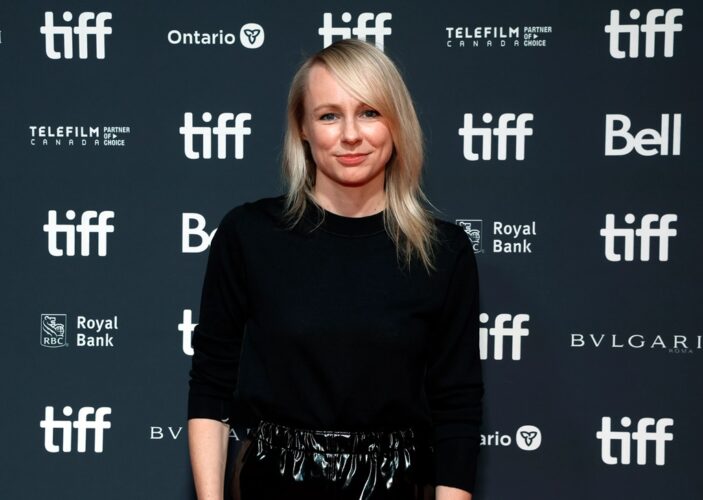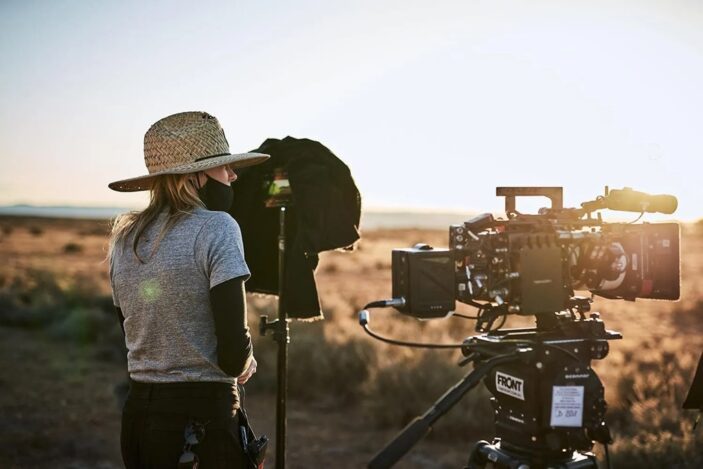
After the uncomfortable mastery of The Assistant, an increasingly intense drama following the daily activity of an assistant to an insidious, powerful movie mogul, director Kitty Green easily placed herself on the map of filmmakers to follow.
For her sophomore feature she’s maintaining that sense of dread – though she would beg to differ – for The Royal Hotel, an Australian-set thriller about Americans Hanna (Julia Garner) and Liv (Jessica Henwick), best friends backpacking across the country. After they run out of money, Liv, looking for an adventure, convinces Hanna to take a temporary live-in job behind the bar of a pub called ‘The Royal Hotel’ in a remote Outback mining town. Bar owner Billy and a host of locals give the girls a riotous introduction to Down Under drinking culture but soon Hanna and Liv find themselves trapped in an unnerving situation that grows rapidly out of their control.
Ahead of the film’s local release (it’s set to open November 23rd), Peter Gray spoke with Green about subverting the tropes of the thriller genre, committing to unhappy endings, and how international audiences have been perceiving her film in a much different manner than expected.
I briefly spoke to you following the film’s Australian premiere at SXSW Sydney, so I will reiterate my congratulations on the The Royal Hotel. I love that it went in a completely different direction than where I imagine a lot of people will expect it to go. We’re so conditioned as audiences to expect the worst of a film that sets up two females in the Australian outback. Was it always the idea to subvert that genre trope from the beginning?
I think in taking (the story) on like that was interesting. I saw the documentary, Hotel Coolgardie, and I felt like there was something in it (about) just seeing that whole environment from that point of view. Having those characters through that lens that made you want to root for them, I guess. That was exciting for me (and) that became the driving force to dig into making (the story) fictional.
Did you find it difficult in deciding what to dramatize for the story? Was there anything you took from the documentary itself and embellished? Or was it more just the basis of that story and The Royal Hotel was an expansion?
I watched (Hotel Coolgardie) twice, and Oscar (Redding), who I wrote it with, watched it once, and then it just sat in the back of our brains versus going through each scene. It was kind of that thing where it forms the bones of the story, and then we’re adding our own muscle and skin. It was interesting. (Hotel Coolgardie) is definitely a big part of the fabric of (The Royal Hotel), but we never really ripped it apart in that way. We did our own research, and took a lot from our own lives of visiting pubs and meeting people, and we were able to dream up a lot of the circumstances in the film through that.
One of the things I really loved, and it’s the smallest detail, but it amused me – and it seemed to amuse the audience I saw this with too – when “Locomotion” is being played. What was the inspiration behind choosing that specific song for that scene? Is it a case of if you’re going to listen to Kylie Minogue you might as well go back to the classics?
I think so. I think it was when we were having fun with the idea of introducing these girls to Australia, it became about, “Well, you gotta have Kylie!” I would have loved to have had AC/DC, but we couldn’t afford it. Kylie was a fun one, and it was kind of nice the idea of this cheeky young guy (Toby Wallace’s Matty), who’s made some dick jokes at the bar, showing a fondness for Kylie Minogue. It warms the girls to him a little bit. We had fun with those clichés and tropes.

On the mention of those clichés and tropes, the film has such a lingering sense of dread throughout, and whenever a character would veer off there’s that immediate sense of “What’s going to happen?” When you were writing the film, did it ever start to pivot towards a more horrific temperament? Or was it always going to be this deliberate attempt at teasing the audience and never following through as one would expect?
We were careful the whole way in that we wanted to dance on that line without ever crossing it. And we had discussions about that. How do we make this a kind of game and how much can we push before these girls would actually leave. There’s certain events (in the film) and we were always trying to figure out how can we make this situation feel safe enough for them to stay the next night. There was one scene where the girls discovered a snake in the house, and the character of Dolly rescues the snake. That was our way of getting the snake out of the house, because the original scene saw him stomp it to death, and we would think “Well, that would make the girls leave.” It was making them feel safe, but also terrified enough that they’re on edge.
Expanding on the characters of Hanna and Liv, we’re given a little backstory of their relationship, but there’s so much expressed internally throughout the film. Did Julia and Jessica come up with their own ideas of who these characters were? Were you involved in any discussions as to who these two people were?
We had a few discussions about where they came from. The production designer wanted to make ID cards for them, or their wallets, and give them props and things. We kinda had to figure out what state they were from (too). I never felt like it was absolutely necessary though, because when you saw them together and they sleep on each others’ beds and they hold each other tight, you always sense they had a history. I didn’t need to add in a line of, “Oh, I went to college with you.”
Julia is very impulsive, and I feel like she’s best when I throw her into something and she just reacts to it. I think there was an element of not trying to load her up with too much beforehand (and) just let her explore the experience. Those scenes in the bar were crazy, with 60 extras all singing “Happy Birthday”, and we wanted her to fall into it and experience it as if she were the character. I wanted those characters to have something in common with (the actresses). Here they are, fresh off the plane from America, and they’re wondering where they are. Taking them to the middle of nowhere was a good way to live in it a little bit.

Having worked with Julia on The Assistant, was she always who you had envisioned for this role?
Yeah, and I think I probably took this on because I knew it would be a role for her to play. I was so excited to work with her again. Both films exist on her face and her perception of events, and the way she’s handling her environment. I knew that she could pull it off. I was that confident in her.
The way this film has been executed really made me question so much. As you said, it’s a film that exists on her perception. There was a part of me that always wondering how much of what we are seeing is actually taking place. And the way the film then escalates… with that final shot being so satisfying, but heartbreaking at the same time.
It’s not very happy, is it? It’s an interesting one. It was about making sure that they stood up for themselves, you know? That they didn’t leave without standing up for themselves and their rights. Them just being able to say “No” was important to me. Partly because The Assistant had such a bleak ending, and it was sort of an acceptance of the system being rotten. Here, I didn’t want to accept it. Let’s take a stand.
There’s actually two ways to watch (The Royal Hotel). One is through Liv’s point of view, and the guys really just did want to take her to see the sunset, and they did just want to take her to get cigarettes… there’s a very innocent way of viewing the movie. But we like that the film never shows you its cards. It’s up to the viewer to imagine where it could potentially go.
And in how people watch the film, how have you found the American reception to the film? Obviously as Australians we have certain terms and phrases that could be deemed offensive, but aren’t at all. Just dropping the “C word” as we do could be quite shocking to hear.
It was interesting because we cut the film in Australia, and we watched it with hundreds of Australians over months and months, and we never discussed the film being as tense as everyone was deeming it. We laughed a lot! The second time you watch it, it’s very funny. I think once you know where it’s going, you can kind of enjoy it and laugh with it. It’s weird trying to unpack why people are so terrified by it.
As soon as Hugo (Weaving’s character) uses the “C word”, which is maybe 6 minutes into the film, Americans are completely on edge. They just don’t trust the character at all. Whereas the Australians, they can kind of warm to him and see him not as a bad guy, because straight after he says it he’s telling the girls to put some clothes on because “It’s not that kind of place”, so you can see he’s alright. Americans are not having it though. It’s been interesting to watch that play out. It’s playing a lot better in Australia.
The Royal Hotel is screening in Australian theatres from November 23rd, 2023.
